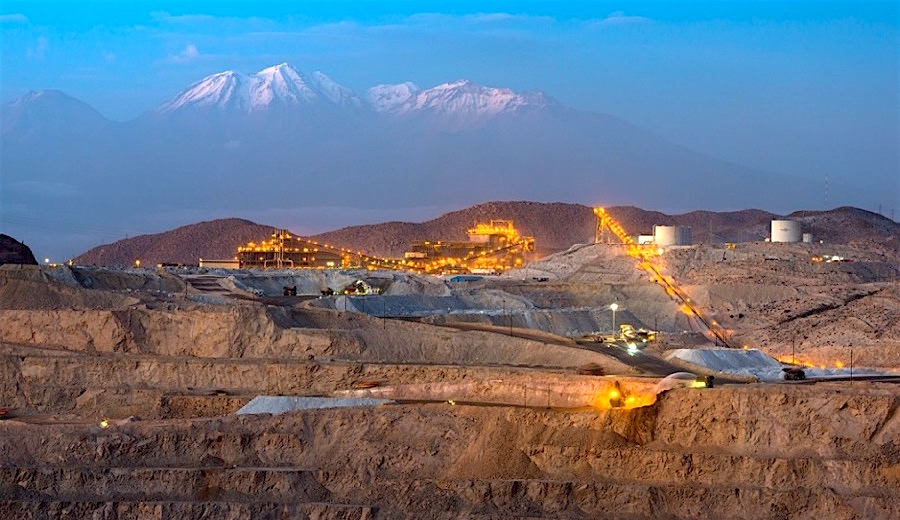Freeport CEO open to all options, even sale, after Grasberg

With a resolution to Freeport-McMoRan Inc.’s Indonesian saga in sight, Chief Executive Officer Richard Adkerson says any strategic move is now possible, including acquisitions, partnerships, or even a sale of the entire company.
With a package of agreements close to being sealed, the future, strategically for us, is going to be wide open, Adkerson said.
Freeport is planning to remain an independent entity, Adkerson said Thursday in a wide-ranging, 90-minute phone interview. “But if an opportunity for us to sell to another company would arise, and that would be good for our shareholders, you would see us trying to get the best deal we can get as opposed to being a company where management is trying to protect itself.”
Freeport has been engrossed in intensive negotiations with Indonesia to cede majority control of its flagship Grasberg mine to local interests for almost two years.
One possibility is acquisitions. While he wouldn’t rule that out, Adkerson said they are harder to justify than spending to expand the company’s existing portfolio of mining assets. “I would argue that we’re getting virtually no value at our share price today from our resources,” he said.
Freeport fell 0.9 percent to $13.16 at 9:35 a.m. in New York.
Adkerson has previously highlighted the potential to expand its Lone Star operation in eastern Arizona, and to further develop resources in South America. However, copper prices need to be above $3 a pound for the industry to invest in brownfield development, and Freeport is no exception. The world’s largest publicly traded copper producer won’t pull the trigger on new projects until market uncertainties are resolved, Adkerson said, noting that while copper fundamentals are strong, global trade tensions are weighing on prices.
Despite that, he said the Phoenix-based company has never been afraid to make big purchases that make sense. “We stepped up and did the Phelps Dodge deal when nobody else was willing to,” he said. “That was two and a half times our size.”
Freeport also is regularly approached by companies about partnerships, he said, and maintains a good relationship with London-based Rio Tinto Group, which agreed to sell its full stake at Grasberg as part of the broader deal that saw majority ownership of the asset transferred to local interests.

‘I understand’
“They’re very interested in looking for opportunities to partner with us, as is everybody in the global copper industry, including Chinese companies,” Adkerson said of Rio. Rio’s decision to sell Grasberg was a “strategic” move made during a time of great uncertainty in which they were faced with a requirement to divest 50 percent of the asset, he said. “I understand why they made the decision.”
Rio declined to comment.
Vancouver-based Teck Resources Ltd. has said it’s looking for a partner for its Quebrada Blanca Phase 2 expansion project in northern Chile. “We’re following it and I don’t think it’s appropriate to comment more than that,” Adkerson said. “Teck’s a company that we have a great relationship with, and it’s an interesting project.”
Partnerships with Chinese companies are also an option. A number of Chinese companies are already Freeport’s customers through its sale of copper concentrates, he said. Executives also got to know management at China Molybdenum Co. during the latter’s purchase of Freeport’s stake in the Tenke Fungurume mine in Democratic Republic of Congo, as well as other Chinese companies that were interested in the mine. Freeport also has a “great relationship” with Japan’s Sumitomo Corp., which controls 28 percent of the Morenci copper mine in Arizona, he said.
Not in the cards
Chinese companies have been actively acquiring mines around the world. Asked if any have approached Freeport in recent years about a possible takeover, Adkerson said a tie-up would be unlikely to be approved by U.S. regulators, who see copper as a strategic metal. “We supply a third to 40 percent of the copper to U.S. industry, and so I don’t think it would be in the cards, politically in the United States, for a Chinese company to buy Freeport as a corporation, and they all recognize that.”
Freeport hasn’t been directly impacted by U.S.-China tensions, Adkerson said, because anything it sells to China is produced outside the U.S. and it doesn’t import copper products from the Asian country. The trade war only affects Freeport insofar as it influences the global economy, he said.
‘Purpose in life’
Under Adkerson’s watch, Freeport has had its ups and downs, including a “value-destructive” purchase of energy assets in 2014, according to Chris Mancini, an analyst at Gabelli & Co.
“He’s kind of endured the company’s darkest hours and now they can see some light,” Mancini said by phone. “If the Grasberg deal gets finalized, then the ship has been righted.”
At that point, one of the biggest questions for Freeport becomes how long Adkerson, 71, will stay at the helm. Given the years of negotiations in Indonesia and a massive deleveraging effort after the commodities downturn, it’s been a tough road, Adkerson acknowledges. “I’ve learned the difference between purpose in life and enjoyment because not all of this has been enjoyable.”
That said, he remains in good health, has no immediate intention to retire, and is looking forward to speaking more often with investors and analysts. In the meantime, Freeport is making plans for succession, he said.
“That could happen in several ways, in terms of having some ongoing involvement,” Adkerson said. “But there’s nothing right now except to focus on business at hand.”
(By Danielle Bochove)
{{ commodity.name }}
{{ post.title }}
{{ post.date }}




Comments